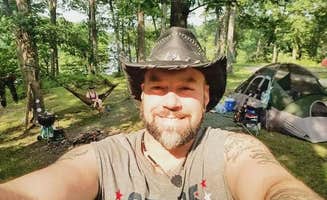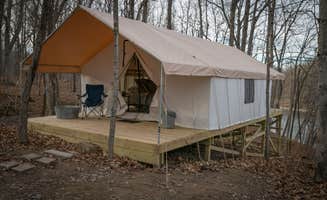Tent camping options near Williamsville, Illinois consist primarily of state-managed conservation areas and small city parks within a 30-mile radius. Most campgrounds maintain primitive facilities with vault toilets and limited amenities. The region features gently rolling terrain with a mix of open fields and wooded areas, creating varied camping environments from exposed meadow sites to more sheltered forest locations.
What to do
Fishing opportunities: Spring Lake State Fish and Wildlife Area offers extensive shoreline access for anglers. The lake's shallow profile makes it productive for various fish species. As one visitor noted, "There is lots of fishing opportunity here. Spring Lake is long and shallow. They allow pole fishing. We saw people fishing from boats as well as from nicely designed pullouts along the road."
Hiking trails: Several camping areas provide direct trail access from campsites. At Spring Lake State Fish and Wildlife Area, "Deer run hiking trail is right in camp and gets you a bit of a hike." The trail system connects various parts of the conservation area through wooded sections.
Wildlife observation: Campgrounds in the region host diverse wildlife, particularly in evening hours. Waverly Lake campers should "Be mindful of field roaches and raccoons at night, as we had to learn the hard way the morning after our first night," according to one reviewer who stayed during summer months.
What campers like
Privacy between sites: At Waverly Lake City Park, campers appreciate the spacious layout: "Each site is spread out and fairly well." This separation creates more private camping experiences compared to more developed campgrounds.
Quiet atmosphere: Low visitation rates contribute to peaceful camping experiences. One Waverly Lake visitor mentioned, "Each time there has only been one other person. It's quiet and peaceful, however there's not much to do."
Natural surroundings: Edward Madigan State Fish and Wildlife Area provides a natural setting that appeals to families seeking basic outdoor experiences. A reviewer commented simply, "Would take my family back!" suggesting satisfaction with the natural environment despite minimal facilities.
What you should know
Limited facilities: Most tent campgrounds have basic amenities only. At Waverly Lake, "As far as I know there's no running water. There are portable toilets that are kept clean."
Access challenges: Some campgrounds require extended drives on unpaved roads. At Spring Lake State Fish and Wildlife Area, campers should "Be ready for a long slow drive in to the campground. Follow signs that direct you to the camp office. That's where the camping is."
Camping restrictions: Time limits apply at certain locations. Waverly Lake enforces a "4 consecutive day per month limit," requiring longer-term campers to relocate periodically.
Insect preparation: Summer camping requires insect protection throughout the region. One Waverly camper warned, "Oh, and the mosquitoes are BRUTAL. Come prepared."
Tips for camping with families
Wildlife education opportunities: Children can observe various wildlife safely, but proper food storage is essential. Store all food items in sealed containers to prevent attracting raccoons, particularly at Waverly Lake where nocturnal visitors are common.
Simple camping experiences: Spitler Woods State Natural Area offers basic sites appropriate for introducing children to camping. A visitor noted it has "Great sites. Plenty to do. Favorite place to camp in Illinois."
Gradual walk-in requirements: While labeled as walk-in camping, Spring Lake's tent sites remain relatively accessible. A camper explained: "This campground has walk-in only camping but it's right next to where you park," making it manageable for families with younger children.
Tips from RVers
Limited RV options: Most tent camping areas near Williamsville have minimal RV facilities. Hidden Ridge permits RVs but lacks hookups, requiring self-contained camping.
Primitive parking conditions: RVs accessing tent camping areas should be prepared for unimproved parking surfaces. During wet periods, larger vehicles may experience traction issues on unpaved access roads and parking areas.



